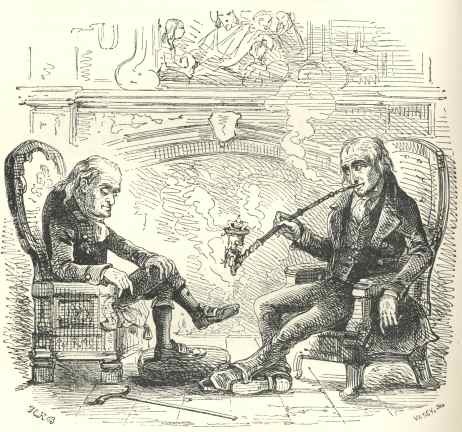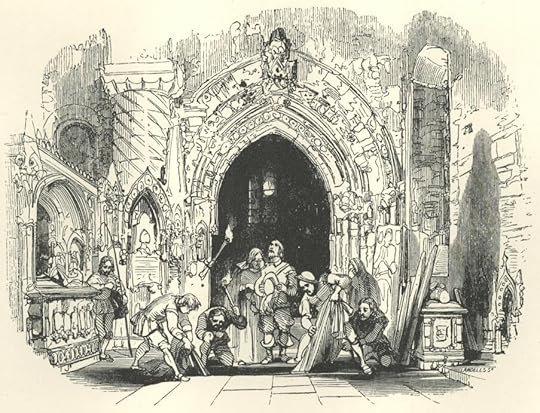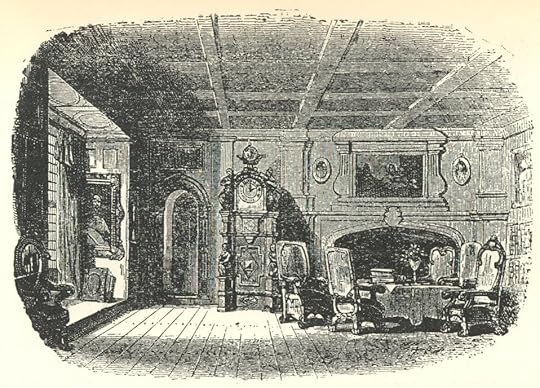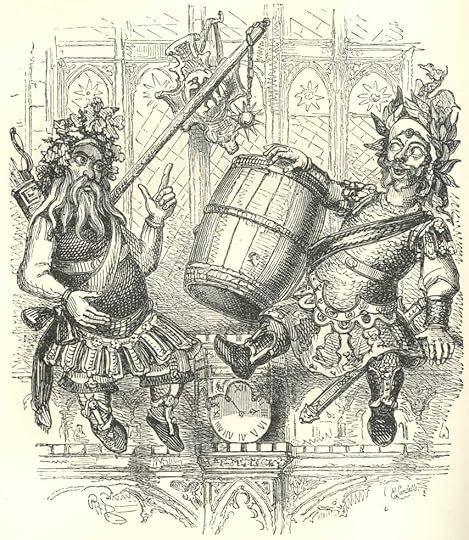The Obscure Reading Group discussion

This topic is about
Master Humphrey's Clock
Master Humphrey's Clock
>
Week 1 Discussion: Master Humphrey’s Clock
date newest »
newest »
 newest »
newest »
I just finished reading the last section, and was thinking about how reading aloud was common in Victorian times, and these stories really lend themselves to being read that way. No one I know is interested in listening, so sometimes I read parts aloud to myself. :-)
So far I'm really enjoying the framework. I love Master Humphrey and the idea of a group of folks submitting stories and hiding them away in the clock. He is described as lonely, but is he really?
So far I'm really enjoying the framework. I love Master Humphrey and the idea of a group of folks submitting stories and hiding them away in the clock. He is described as lonely, but is he really?
 Kathleen wrote: " I love Master Humphrey and the idea of a group of folks submitting stories and hiding them away in the clock. He is described as lonely, but is he really? ..."
Kathleen wrote: " I love Master Humphrey and the idea of a group of folks submitting stories and hiding them away in the clock. He is described as lonely, but is he really? ..."Well, as I understand it, Jack Redburn and Mr. Owen Miles are living in the house with him. So not alone, at least. I am enjoying Master Humphrey's first person memoir style more than I expected to. In this illustration by Phiz, we see Master Humphrey and the Deaf Gentleman (do we learn his name in this section?). That's quite the pipe. Takes three and a half hours to smoke. Is this believable? Any pipe smokers in the group?

 Magog's story of the sad fate of Alice the Bowyer's daughter sounds very much like the sad fate of Emily in David Copperfield, written a few years after this. Sort of a first draft, perhaps? What do you Dickens enthusiasts think about this?
Magog's story of the sad fate of Alice the Bowyer's daughter sounds very much like the sad fate of Emily in David Copperfield, written a few years after this. Sort of a first draft, perhaps? What do you Dickens enthusiasts think about this?
Ginny wrote: "Magog's story of the sad fate of Alice the Bowyer's daughter sounds very much like the sad fate of Emily in David Copperfield, written a few years after this. Sort of a first draft, pe..."
The more I read lesser-known Dickens, the more I run into these overlaps. There's also a similar storyline in The Battle of Life that reminded me of Emily. I think it's kinda fun to see these, especially the ones that came before the major novels--first draft as you say!
The more I read lesser-known Dickens, the more I run into these overlaps. There's also a similar storyline in The Battle of Life that reminded me of Emily. I think it's kinda fun to see these, especially the ones that came before the major novels--first draft as you say!
 I like how Dickens populates his novels with lovable characters! Folks were infinitely more unconditioned, plain and simple in those days. When I found my original old copy beside my easy chair in 2005, left there by my better half, I was enthralled. I thought back then humanity could go back to that gentler way of life! Nowadays (is it any wonder?) I see that door back is locked and barred, alas.
I like how Dickens populates his novels with lovable characters! Folks were infinitely more unconditioned, plain and simple in those days. When I found my original old copy beside my easy chair in 2005, left there by my better half, I was enthralled. I thought back then humanity could go back to that gentler way of life! Nowadays (is it any wonder?) I see that door back is locked and barred, alas.
 I’m enjoying reading Master Humphrey. There’s something peaceful about the narrative, almost relaxing at times, in ways that the novels aren’t from my perspective. Does anyone see Master H as Dickens himself or is he as much a creation as all the characters in all the other stories and novels?
I’m enjoying reading Master Humphrey. There’s something peaceful about the narrative, almost relaxing at times, in ways that the novels aren’t from my perspective. Does anyone see Master H as Dickens himself or is he as much a creation as all the characters in all the other stories and novels?
 Sue wrote: "Does anyone see Master H as Dickens himself or is he as much a creation as all the characters in all the other stories and novels? ..."
Sue wrote: "Does anyone see Master H as Dickens himself or is he as much a creation as all the characters in all the other stories and novels? ..."From what I know about Dickens' life, Master H is nothing like his creator. Maybe that quiet life, with congenial male companions and the old clock as a significant other, was something Dickens dreamed about. Escape from all his children, mistresses, and nuisance of a wife.
Ginny wrote: "That's quite the pipe. Takes three and a half hours to smoke. Is this believable? Any pipe smokers in the group?
"
Love that illustration, Ginny. I am not a pipe smoker, however my father smoked one, and with the size of bowl, and the amount of time it would probably take to get the smoke up that long stem, I wouldn't be surprised!
"
Love that illustration, Ginny. I am not a pipe smoker, however my father smoked one, and with the size of bowl, and the amount of time it would probably take to get the smoke up that long stem, I wouldn't be surprised!
Sue wrote: "Does anyone see Master H as Dickens himself or is he as much a creation as all the characters in all the other stories and novels?"
I think there is a strong resemblance, Sue. Doesn't Master H like to take long walks too, like Dickens did?
I agree about the peaceful narrative, and combined with what Fergus said about the simple and gentle characters, this is a really soothing read.
I think there is a strong resemblance, Sue. Doesn't Master H like to take long walks too, like Dickens did?
I agree about the peaceful narrative, and combined with what Fergus said about the simple and gentle characters, this is a really soothing read.
 I smoked a pipe at college. Some friends thought the aroma was heavenly, while others found it disgusting. Certainly it destroyed my taste buds with its sharp bite! Pipe smokers were already a rarity in the sixties...
I smoked a pipe at college. Some friends thought the aroma was heavenly, while others found it disgusting. Certainly it destroyed my taste buds with its sharp bite! Pipe smokers were already a rarity in the sixties...
 I finished this first section and I have to say I'm not a fan. Everything seems disjointed to me and a bit bizarre - like the brief recounting of the child murder, and then brief notation that the wife had lost her senses and moving onto the next thing. I'm not finding the characters to be particularly lovable, particularly the narrator.
I finished this first section and I have to say I'm not a fan. Everything seems disjointed to me and a bit bizarre - like the brief recounting of the child murder, and then brief notation that the wife had lost her senses and moving onto the next thing. I'm not finding the characters to be particularly lovable, particularly the narrator.
I agree with you about bizarre, Dianne, but I'm reading this more like an old-fashioned tall tale, so the bizarreness fits. I grew up with this kind of thing (like Paul Bunyan), so it's easy for me to fall into it, but I can understand why it's not for everyone.
And I'd think it definitely wouldn't be enjoyable if you don't find Master Humphrey endearing. Sorry this isn't working for you--at least it's short. :-)
I've also found a lot of Dickens' lesser-known works to be on the strange side--probably the reason they are lesser-known!
And I'd think it definitely wouldn't be enjoyable if you don't find Master Humphrey endearing. Sorry this isn't working for you--at least it's short. :-)
I've also found a lot of Dickens' lesser-known works to be on the strange side--probably the reason they are lesser-known!
 Yes, Dianne, it IS disjointed. I see that throughout his work. Dickens had a traumatic upbringing and, since mine was the same, know it can create a certain jerkiness in our mannerisms. Add also to that mix the fact that these stories were originally published in serial form! Part of Dickens' genius is his instant inventiveness...
Yes, Dianne, it IS disjointed. I see that throughout his work. Dickens had a traumatic upbringing and, since mine was the same, know it can create a certain jerkiness in our mannerisms. Add also to that mix the fact that these stories were originally published in serial form! Part of Dickens' genius is his instant inventiveness...
 It's reminding me a lot of another Dickens compendium, The Pickwick Papers. I remember that one jumping around a lot too. They both read like gathered short periodical stories. Were they?
It's reminding me a lot of another Dickens compendium, The Pickwick Papers. I remember that one jumping around a lot too. They both read like gathered short periodical stories. Were they?
 Yes, I believe so, though Kathleen would know for sure. Certainly Humphrey is disjointed for that reason.
Yes, I believe so, though Kathleen would know for sure. Certainly Humphrey is disjointed for that reason.
Well, I wouldn't dream of letting Fergus down! So here's what it says in the introduction to my copy:
"Dickens popularity as a novelist had been firmly established by The Pickwick Papers, Oliver Twist and Nicholas Nickelby, when at the age of twenty-seven, he outlined ... the scheme for Master Humphrey's Clock ... Dickens was the sole author of this weekly miscellany ..."
And according to Wikipedia, it was a "weekly periodical edited and written entirely by Charles Dickens and published from 4 April 1840 to 4 December 1841."
So to Sara's question, they were gathered, but were meant to be read with some distance between them, like some of Dickens' other works.
I love what Fergus says about Dickens' "instant inventiveness." I always picture him being able to pull stories out of his hat, kind of like my father used to do with bedtime stories. :-)
"Dickens popularity as a novelist had been firmly established by The Pickwick Papers, Oliver Twist and Nicholas Nickelby, when at the age of twenty-seven, he outlined ... the scheme for Master Humphrey's Clock ... Dickens was the sole author of this weekly miscellany ..."
And according to Wikipedia, it was a "weekly periodical edited and written entirely by Charles Dickens and published from 4 April 1840 to 4 December 1841."
So to Sara's question, they were gathered, but were meant to be read with some distance between them, like some of Dickens' other works.
I love what Fergus says about Dickens' "instant inventiveness." I always picture him being able to pull stories out of his hat, kind of like my father used to do with bedtime stories. :-)
 Ginny and Kathleen, I love your answers to my thoughts about Master Humphrey and Dickens. Perhaps Humphrey is something like who Dickens would become later in life when presenting his stories on the stage. He was certainly highly regarded. And perhaps a part of him already longed for a place apart from his family where he could relax with only select, male company. I haven’t read Forster’s biography yet, but did Dickens go to Forster’s house to consult on writing? That might have been a “release” of sorts.
Ginny and Kathleen, I love your answers to my thoughts about Master Humphrey and Dickens. Perhaps Humphrey is something like who Dickens would become later in life when presenting his stories on the stage. He was certainly highly regarded. And perhaps a part of him already longed for a place apart from his family where he could relax with only select, male company. I haven’t read Forster’s biography yet, but did Dickens go to Forster’s house to consult on writing? That might have been a “release” of sorts.I agree about the episodic nature of the reading but it didn’t bother me at all. I found it seemed to fit into what I was expecting of Master Humphrey’s group.
I’m also considering reading Pickwick Papers again at some point too. If it’s episodic like this, I may do better this time. I read it in college and remembered it as enjoyable but an attempted reread got nowhere.
Sue wrote: "Ginny and Kathleen, I love your answers to my thoughts about Master Humphrey and Dickens. Perhaps Humphrey is something like who Dickens would become later in life when presenting his stories on th..."
I like what both you and Ginny said about Master Humphrey's situation being something Dickens might have wished for.
I've never read Pickwick Papers, so that's definitely something for me to look forward to in the future!
I like what both you and Ginny said about Master Humphrey's situation being something Dickens might have wished for.
I've never read Pickwick Papers, so that's definitely something for me to look forward to in the future!
Which of the two clock stories do you all like best (if you like them)?
I'm partial to the Giant Chronicles. I liked Gog and Magog and Joe Toddyhigh hiding in the big Hall. I also liked the way, in the setup, the Lord Mayer had elements of Scrooge.
I'm partial to the Giant Chronicles. I liked Gog and Magog and Joe Toddyhigh hiding in the big Hall. I also liked the way, in the setup, the Lord Mayer had elements of Scrooge.
 Gog and Magog took me straight into a strange and bizarre glimpse of Victorian London as it must have seemed (with all its underside intact) to the sensitive soul of Dickens. In a very real sense it is prescient of modern Magic Realism and surrealism!
Gog and Magog took me straight into a strange and bizarre glimpse of Victorian London as it must have seemed (with all its underside intact) to the sensitive soul of Dickens. In a very real sense it is prescient of modern Magic Realism and surrealism!
Fergus, Quondam Happy Face wrote: "Gog and Magog took me straight into a strange and bizarre glimpse of Victorian London as it must have seemed (with all its underside intact) to the sensitive soul of Dickens. In a very real sense i..."
I hadn't thought about him actually pioneering something here, Fergus. What an interesting idea! And I agree about it taking the reader to that time and place, and using imaginative touches to great effect.
I hadn't thought about him actually pioneering something here, Fergus. What an interesting idea! And I agree about it taking the reader to that time and place, and using imaginative touches to great effect.
 Yes, isn't Dickens, like so many contemporary Continental writers, pushing the bounds of the novel? He had to let the steam out! Dostoevsky was doing similar things in Russia - like Dickens, exacerbated by current economic conditions - raging against the system, and frustrated with polite literary norms. Make no mistake, I believe Dickens here had a satirical axe to grind!
Yes, isn't Dickens, like so many contemporary Continental writers, pushing the bounds of the novel? He had to let the steam out! Dostoevsky was doing similar things in Russia - like Dickens, exacerbated by current economic conditions - raging against the system, and frustrated with polite literary norms. Make no mistake, I believe Dickens here had a satirical axe to grind!
 Kathleen wrote: "Which of the two clock stories do you all like best (if you like them)? ..."
Kathleen wrote: "Which of the two clock stories do you all like best (if you like them)? ..."My favourite story so far (although maybe not a "clock story?) is Mr. Pickwick's witch story. When I started it, I was cautious--where is this going? But Will Marks is such a great character--living a courageous life knowing that the witch stories were nonsense. Doing what he can to help out people who were being unjustly persecuted. This story is satirical, yet compassionate. And keeping the secret while giving the townspeople a salacious a tale that satisfied them was the high point of the story.
Will Marks arrives at the Church by George Cattermole

Dickens and Cattermole had an interesting friendship.
One of the most significant moments in the artist's life was his introduction to the young and upcoming writer "Boz" (Charles Dickens) at some time in 1836 at the Gore House (London) salon of Countess of Blessington. The twenty-four-year-old Dickens was much impressed with the dashing, fun-loving, stagecoach-driving thirty-six-year-old bachelor whose rooms in The Albany had once been occupied by Lord Byron (who apparently had left some of his furniture behind). Perhaps because he was already a well-established artist when Boz was still a struggling writer of sketches, and perhaps because in 1839 he had declined a knighthood for his oils and watercolours on mediaeval subjects, Charles Dickens was always slightly in awe of Cattermole, who on 20 August 1839 married Clarissa Elderton, a distant relative of Dickens's mother (Elizabeth neé Barrow), at St. Marylebone, London.
From https://victorianweb.org/art/illustra...
 I think my favourite - though it comes later, but no spoilers - is the story of the formation of the Second story club, the Kitchen Clock Club!
I think my favourite - though it comes later, but no spoilers - is the story of the formation of the Second story club, the Kitchen Clock Club!
 Speaking of rabbit holes.. I have been exposed to a few of Dicken’s most famous works, but have never taken any sort of deep dive..
Speaking of rabbit holes.. I have been exposed to a few of Dicken’s most famous works, but have never taken any sort of deep dive.. In “A Confession Found in a Prison in the Time of Charles the Second,” the criminal is approached by bloodhounds while sitting on the site of his victim’s burial, loses his
composure and incriminates himself to the gentlemen he is with. This reminded me of the climactic scene in E.A. Poe’s “The Tell-Tale
Heart,” so of course I looked it up and in fact there is discourse on the influence that Dickens had on Poe, generally and specifically for that famous tale.
So the construct of our obscure book is one that Dickens used to send out literary trial balloons and it appears that both he and his contemporaries used these efforts to further their writings. Fascinating.
Ginny wrote: "My favourite story so far (although maybe not a "clock story?) is Mr. Pickwick's witch story. When I started it, I was cautious--where is this going?"
How interesting about Cattermole! Thanks for sharing that. And I had a similar reaction to the witch story, a little concerned about what he was going to do. But you're absolutely right--satirical and compassionate.
How interesting about Cattermole! Thanks for sharing that. And I had a similar reaction to the witch story, a little concerned about what he was going to do. But you're absolutely right--satirical and compassionate.
Fergus, Quondam Happy Face wrote: "I think my favourite - though it comes later, but no spoilers - is the story of the formation of the Second story club, the Kitchen Clock Club!"
I'm in the kitchen right now with housekeeper and her visitors! We'll discuss in the next thread. :-)
I'm in the kitchen right now with housekeeper and her visitors! We'll discuss in the next thread. :-)
Craig wrote: "Speaking of rabbit holes.. I have been exposed to a few of Dicken’s most famous works, but have never taken any sort of deep dive..
In “A Confession Found in a Prison in the Time of Charles the S..."
What a great find, Craig! How fun to follow the threads of influence. I'm off to re-read the Confession with Poe in mind.
In “A Confession Found in a Prison in the Time of Charles the S..."
What a great find, Craig! How fun to follow the threads of influence. I'm off to re-read the Confession with Poe in mind.
The Week 2 thread is open, in case it's February 8th where you are!
https://www.goodreads.com/topic/show/...
https://www.goodreads.com/topic/show/...
 Craig wrote: "Speaking of rabbit holes.. I have been exposed to a few of Dicken’s most famous works, but have never taken any sort of deep dive.. "
Craig wrote: "Speaking of rabbit holes.. I have been exposed to a few of Dicken’s most famous works, but have never taken any sort of deep dive.. "Did Poe plagiarize Dickens? I found a very interesting essay which analyses several of the similarities between Poe's stories those by Dickens. You can read for free with a jstor account. The conclusion this essayist comes to is:
....I do not believe however that Poe consciously plagiarized Dickens. What he did was to take inspiration, some specific ideas and motifs, and even occasionally some stylistic devices, and he also managed to elaborate them and create new works sometimes superior to his sources. That cannot be described as plagiarism, but as a conscious, careful and patient combination of a diversity of materials and techniques, carried out understandingly, as Poe liked to define genuine originality.Plagiarism is very much in the news these days. Definitely an interesting find, Craig.
https://www.jstor.org/stable/41507876...
Books mentioned in this topic
The Pickwick Papers (other topics)Oliver Twist (other topics)
Nicholas Nickelby (other topics)
Master Humphrey's Clock (other topics)
The Pickwick Papers (other topics)
More...








If you’ve read the whole book, try to avoid spoilers for anything after section 3, but otherwise please share anything you wish! It may be easiest if we note the section or chapter title we’re commenting on.
Fergus has suggested this one for us, so I’m hoping he will want to comment on some of his favorite parts. :-)
My experience with Dickens shorter fiction is it can be full of references, asides, and potential rabbit holes to go down. If you run across any that interest you and you want to discuss them, please do--we’ll all benefit!